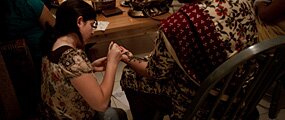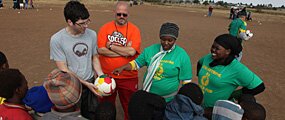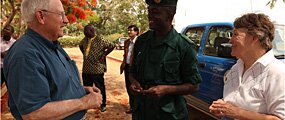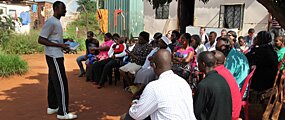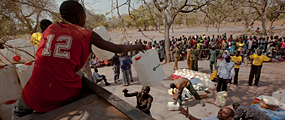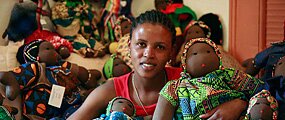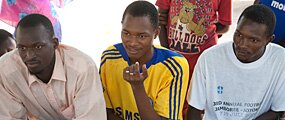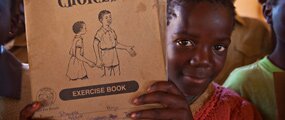Highs and Lows
Posted August 18, 2010
In the past couple of years, missionaries among the Bambara people of Mali have seen unprecedented response to the Gospel. Work among West Africans is typically slow, but hundreds of Bambara are deciding to follow “the Jesus road.”
The Missionaries:
Steve and Susan (children: Eric and Megan)
Hometowns: Frederick, Oklahoma (Steve) and Orlando, Florida (Susan)
Home church: First Baptist Orlando
Shirley
Hometown: Sparta, Tennessee
Home church: Bear Cove Baptist
LaVerne
Hometown: Red Oak, Oklahoma
Home church: First Baptist Red Oak
Arnett and Crystal (son: Zeke)
Hometown: Live Oak, Florida
Home church: First Baptist Live Oak
Mitch
Hometown: Crystal Springs, Mississippi
Home church: First Baptist Crystal Springs
Work among West Africans is typically slow, but in the past couple of years, hundreds of Bambara people in Mali have decided to follow “the Jesus road.” These seven missionaries are using Bible storying to lead people to faith in Christ, teach them to grow in their walk, and encourage them to remain strong in the face of persecution.
Follow their journey, as shared by Susan through prayer newsletters:
May 7, 2009
Elderly Iza* face contorted, skirt flying, threw the Bible in the dirt and stomped on it. “Why can’t you keep a job?” she screamed at the teenage boy from whom she’d snatched it. “You come here to find work in Bamako, you live with me and eat my food, but you won’t keep a job!” Dust flew. A small crowd gathered. More yelling. More pain. When it was over, the teen, Jacques*, picked up his Bible and stormed away.
“I can’t keep a job because everyone fires me,” Jacques told me later. “When they find out I am a Christian, they try to force me to recant. They tell me to do their religion’s ritual prayers, or quit. So I lose my job, every time!”
Jacques came to the capital city over a year ago from a small bush village, where he accepted Christ with one of our volunteer teams. His family insists he stay here, insists he find a job, insists he send money home. And he must live in Iza’s house.
Alice* also lives with Iza. Alice and I have been friends for a couple of years. She fled the same bush village when her husband’s beatings got unbearable. Last month, Alice accepted Christ, and she is hungry to know more about Jesus.
Which leaves grouchy old Iza with two Christians under her roof to torment her!
I went to visit last week, and I found Iza home alone. She didn’t scream at me, or yank my Bible out of my hands. Instead, she offered me a chair, leaned her head wearily against a cement wall and told me, “This life is futile. You work and work, but for what benefit? You just die and have to go meet God. There’s no point in life.”
Gently, I shared the Gospel with her. And two days later, Alice told me, “Come and teach us about Jesus. I’d come to your house, but Iza wants to hear, too, and she’s embarrassed to go to you. Will you come to us?”
August 22, 2009
“I just can’t understand this,” Iza told me, shaking her grey head. “I’m just not smart.” I bit my lip in frustration. I had told the Bible story three times. I rephrased my question, but still, “Nope. I can’t understand. I’m dumb.” Iza’s 40-year-old daughter, Alice, who had accepted Christ, was soaking in the lessons I was teaching every week. But not Iza.
 I’ve been meeting weekly with her. And weekly, I was changing tactics, trying to find a way to get Iza to participate. I was failing.
I’ve been meeting weekly with her. And weekly, I was changing tactics, trying to find a way to get Iza to participate. I was failing.
A few weeks ago, Iza was laying on a woven mat in her house’s hallway. “Father,” I prayed silently as I watched her, “Please show me how to get her to understand. I can talk to her freely about any other subject at all. But when I talk about You – it’s like a wall goes up. Please show me how to shatter it.” It occurred to me that, while I had prayed many things for Iza, I had never prayed for a solution to this problem.
A few minutes later, during the lesson, Iza told me again, “I’m dumb. I just can’t understand.” But this time, she added: “You know, if you were speaking Fulbe, this would be a lot easier.”
Light bulb! Iza isn’t ethnically Bambara. Bambara is her second language, just as it is mine. Iza’s Bambara was good enough to fool me, but not good enough for her to understand spiritual truth. I turned to her daughter. “Alice,” I said, “You just did a great job of retelling that Bible story in Bambara. Would you tell it in Fulbe now?” She did, and Iza came alive! She reacted. She commented. She gleaned spiritual truth.
And the next week, when I again shared the Gospel with her – this time with Alice translating my Bambara into Fulbe – Iza accepted Christ. And we’ve been having bilingual discipleship sessions ever since.
September 21, 2009
Crystal hoisted her 3-month-old boy over her shoulder and patted his well-padded bottom. Beside them, a skinny, tiny Malian girl sat diaperless in her mother’s lap. “She’s been sickly since birth,” the baby girl’s mother, Alice, told us. She fingered the fetish tied around her baby’s waist with a string. “That’s why we put some of this medicine on her. It has some of her first hair in it, and it will help protect her from getting ill again. A teacher spoke magic words over it, so it will help.”
Alice is a new Christian – the daughter of Iza. As Crystal and I tried to explain trusting in Jesus alone, Alice shook her head at us. “This has nothing to do with trusting Jesus! I am trusting Jesus. But Africans also use these charms. I know White people don’t do it. But we do. You can trust Jesus and still put this charm on your baby! You can do both!” Nothing we said swayed her. Clearly, she thought we just didn’t understand.
And truth be told, we really don’t.
As we drove away, Crystal told me, “It’s all they have ever known. We are talking to them about giving up everything familiar. ”
January 29, 2010
Arnett and Mitch slurped the last of their millet porridge out of their gourd spoons. Their hostess smiled as she removed the breakfast pot, and then she joined the other women pounding grain under a shade tree. Their host, Dinba*, sat a little teapot on the coals and settled down under the thatched-roof porch – a sign he was ready for a leisurely conversation. Tea makes the talking sweet, the Bambara say.
 The teapot began to wheeze. “You know we are teachers of God’s Word,” Mitch said. “May we tell you a story?”
The teapot began to wheeze. “You know we are teachers of God’s Word,” Mitch said. “May we tell you a story?”
The men passed around the tea in shot glasses and Mitch told about Jesus healing a demon-possessed man. When he was done, Dinba said, “That shows Jesus had a lot of power – because he was God’s Son.” A radical statement for one who follows another major religion of Mali!
“Could I tell you more?” Mitch asked. He explained the Gospel, and several rounds of tea later, the men told Mitch, “We understand everything you’ve said. We want you to come back to tell us more. We want to fully understand.”
February 12, 2010
Mitch and Arnett took a volunteer team to Dinba’s village. Once again, Dinba settled himself under his thatched-roof porch with his guests. Once again, he heard the Gospel – this time presented by a volunteer. “Ever since these guys first came out here, I’ve believed everything they have said,” Dinba replied. “I’m ready to become a Christian.”
Skeptical, the team asked if he was really ready to walk away from the other religion practiced in his village.
“The Bambara say you can’t walk on two roads,” Dinba replied. “I know that I have to choose one. And I choose Jesus’ road.”
In Mali, such a decision often brings persecution, so Mitch asked, “Are you willing to tell anyone else about this?”
“Of course.” Dinba bowed his head and prayed to receive Christ. Then he excused himself and left. When he came back, he said, “I just went and told my mother, and I told my father my decision.”
That night, about 15 other villagers gathered to hear the volunteers teach in the inky blackness. A lone flashlight hanging from the thatched roof spilled light in a dim puddle. Dinba stood up in front of them all. “I want everyone here to know that I have become a Christian today,” he said.
February 19, 2010
The firelight danced on the faces of the women, who were sprawled out on mats around the flames. A few men sat close to the heat, too. After all, it was 70 degrees – bone chilling to a Malian! They had just finished singing a few lively songs about their new faith, but now, sleepiness was seeping into the group. Shirley and LaVerne played a Bible story for them on a recorder, and then Shirley dove into discussion questions.
 “We liked the story, but we can’t retell it,” some of the women told her. “We’ve never been to school! How can we learn this?” another said.
“We liked the story, but we can’t retell it,” some of the women told her. “We’ve never been to school! How can we learn this?” another said.
This group of about 15 are sure about one thing – Jesus. About a year ago, all of them accepted Christ and were baptized in a neighboring village. They all understand the Gospel. They all call themselves Christians. But learning anything more is a struggle for them.
They’ve spent their entire lives in a world of mud huts, cooking fires and millet stalks. They’ve carried well water in buckets on their heads from the time they were old enough to hoist it. All they know is farming. Schooling was out of the question for them. And religion? From their point of view, that is for the educated. And they can’t seem to shake that point of view.
Shirley and LaVerne eventually finished their story and ask for prayer requests. Those were freely given. “Now, who will pray?” Shirley asked. “You!” the group replied, almost in unison.
“But, you can pray, too,” Shirley insisted. “God will hear your prayers as well as He hears mine. You, too, are His children.”
Heads shook. “No, no. We don’t know how to pray. You do it.” Again – they are seeing prayer as “religion,” something for the “religious professional” to do. They are missing that prayer is talking to their Father who loves them.
April 9, 2010
Jacques sat in a folding chair on my cluttered front porch, shaking his head. “I used to really like Christianity,” he told me. “But, the desire to be a Christian is leaving me.” That’s as literal of a translation from the Bambara as I can put into English. Jacques is about 17 years old. He’s the teen who can’t seem to find a job because no one wants to hire a believer – or at least, that is what Iza tells him. Iza is the elderly woman he lives with, who prayed a prayer with me once and said she had become a Christian – but whose life doesn’t seem to really bear that out as truth.
 “I’m ready to give up on Jesus,” Jacques went on. “I don’t want to be any religion at all. Maybe then, I could find some work. Maybe then, I wouldn’t suffer so much.” Of course I tried to reason with him. I talked for a long time, my heart breaking. He was not dissuaded. As he left, he asked Steve, “So can I turn in my Bible and other Christian stuff to you?”
“I’m ready to give up on Jesus,” Jacques went on. “I don’t want to be any religion at all. Maybe then, I could find some work. Maybe then, I wouldn’t suffer so much.” Of course I tried to reason with him. I talked for a long time, my heart breaking. He was not dissuaded. As he left, he asked Steve, “So can I turn in my Bible and other Christian stuff to you?”
The next day, the church leaders from Jacques’ home village came into the capital city to celebrate Easter. And they called for him to come meet them at the big-city church. Sunday morning, Jacques was there with us all – celebrating Christ’s resurrection with the hundreds crammed into the church in the stifling heat, dressed in our African finest. Starched robes swished and head wraps bobbed as we danced to the beat of drums. Jesus is Risen – in every language and in every culture – let it be proclaimed!
Please pray for Jacques. There are many reasons he can’t find work that have nothing to do with his faith. His age is one of them, combined with his inexperience and an enormous unemployment rate for all. Pray that God would provide him a job. Pray that Jacques would decide that Jesus is worth any amount of suffering he may encounter because of Him!
Pray for Iza, that God would work in her heart and convince her of His truth. Pray that He’d prevent her from speaking discouragement into Jacques’ life.
Pray against discouragement for us. It is tempting, when things like this happen, to wonder how many people’s lives truly have genuinely changed as a result of our work. We must trust God with them all.
If you and your church would like to get involved in reaching the Bambara of Mali, visit GoBambara.
If you want to start receiving the Bambara team’s prayer letters via e-mail, indicate your interest on our Feedback Form.
*Name changed for security
Follow Us Online!

















